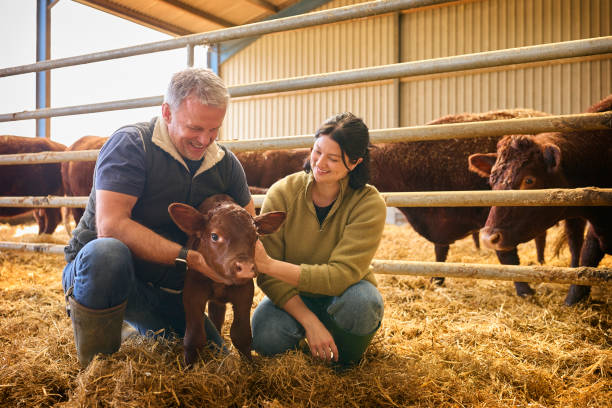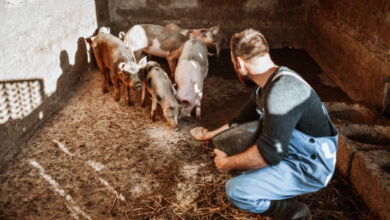Uses of Farm Animals: From Food Production to Sustainable Farming

Uses of Farm Animals: From Food Production to Sustainable Farming
Farm animals play an essential role in agriculture, providing a wide range of products and services that benefit both humans and the environment. Understanding the diverse uses of farm animals can help us appreciate their contributions to our daily lives and the agricultural ecosystem. In this comprehensive guide, we’ll explore the various uses of farm animals, from food production to their economic and social importance.
Food Production
- Dairy Products
Farm animals like cows, goats, and sheep are primary sources of milk, which is used to produce various dairy products.
– Cows: The most common source of milk, which is processed into cheese, butter, yogurt, and other dairy products.
– Goats: Goat milk is known for its rich flavor and is often used in making specialty cheeses.
– Sheep: Sheep milk is used to produce unique cheeses like Roquefort and Manchego.
- Meat Production
Farm animals are a significant source of meat, providing essential nutrients and protein.
– Cattle: Raised for beef, which is a staple in many diets worldwide. Popular breeds include Angus and Hereford.
– Pigs: Pork, bacon, and ham come from pigs, with breeds like Yorkshire and Duroc being well-known for their meat quality.
– Chickens: Chickens are raised for both meat (broilers) and eggs (layers). Broiler breeds like Cornish are specifically bred for meat production.
– Lamb: Sheep provide lamb and mutton, which are rich in flavor and nutrients.
- Egg Production
Eggs are a versatile food product, and several types of poultry are raised for egg production.
– Chickens: The most common source of eggs, with breeds like Leghorn being prolific layers.
– Ducks: Duck eggs are larger and have a richer flavor compared to chicken eggs.
– Quail: Quail eggs are a delicacy and are smaller but rich in nutrients.
Read Also: What Are Farm Animals? Everything You Need To Know
Non-Food Products
- Wool and Fiber
Farm animals provide materials for clothing and textiles.
– Sheep: The primary source of wool, which is used in making clothing, blankets, and other textiles. Merino sheep are renowned for their high-quality wool.
– Goats: Certain breeds, like Angora and Cashmere goats, produce fine fibers used in luxury garments.
– Alpacas: Alpaca wool is highly prized for its softness and warmth.
- Leather
Leather is another valuable product obtained from farm animals, mainly cattle.
– Cattle: Cowhide is processed into leather for fashion items, furniture, and industrial uses.
– Other Animals: Goats and pigs also provide leather, which is used for various purposes.
- Honey and Beeswax
Bees, while not typically considered traditional farm animals, play a crucial role in agriculture.
– Honey: Produced by bees, honey is a natural sweetener with numerous health benefits.
– Beeswax: Used in making candles, cosmetics, and skincare products.
Read Also: Diseases of Farm Animals and How to Prevent Them
Agricultural Benefits
- Labor and Draft Power
Some farm animals are used for labor and draft purposes.
– Horses: Historically used for plowing fields and transportation. Even today, draft horses are used in certain farming operations.
– Oxen: Known for their strength and endurance, oxen are still used in some traditional farming practices.
– Donkeys: Used for carrying loads and performing other labor-intensive tasks on the farm.
- Manure for Fertilization
Animal manure is a valuable resource for fertilizing crops and improving soil health.
– Nutrient-Rich Fertilizer: Manure from farm animals provides essential nutrients that enhance soil fertility and promote healthy crop growth.
– Composting: Animal manure can be composted to create an even more effective organic fertilizer.
- Pest Control
Certain farm animals help manage pests naturally.
– Ducks and Chickens: These birds are excellent at controlling insects and weeds in crop fields.
– Guinea Fowls: Known for their ability to eat ticks and other pests, reducing the need for chemical pesticides.
Read Also: Fish Farming: A Comprehensive Guide.
Economic and Social Importance
- Economic Contributions
Farm animals are vital to the agricultural economy, providing livelihoods and income for farmers.
– Income Generation: The sale of animal products like meat, milk, eggs, wool, and leather supports the financial stability of farming communities.
– Market Demand: Animal products are in high demand, contributing to local and global economies.
- Cultural and Social Roles
Farm animals hold significant cultural and social value in many communities.
– Cultural Traditions: Many cultures have traditional practices and ceremonies involving farm animals.
– Community Benefits: Raising farm animals fosters social bonds and community development, providing food security and employment.




